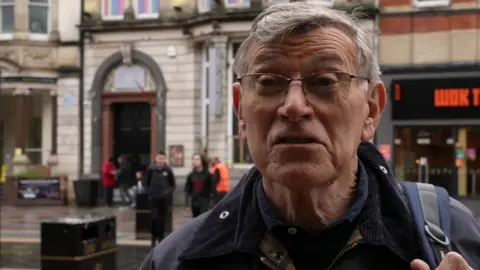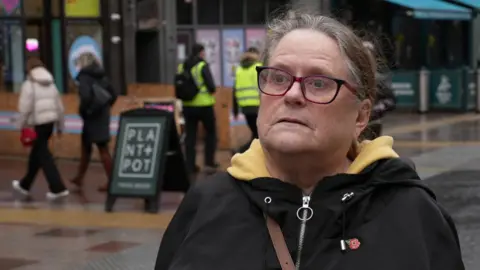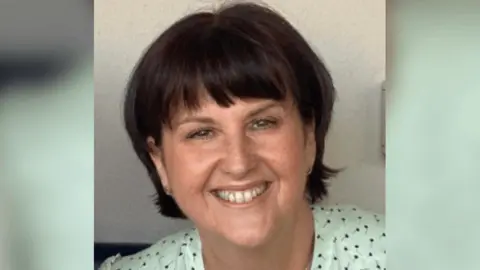NHS in Wales could do less in future - health minister
The NHS may do less in future following a winter of "unprecedented" demand, Wales' health minister has warned.
Eluned Morgan has asked health bosses to prioritise next year and called on the public to take more responsibility for their own health.
She said if people did not change their behaviour, the NHS could have to offer fewer services.
It comes as unions prepare to meet ministers to discuss better pay and working conditions later this week.
Nurses have described working conditions as "hell on earth" due to the number of people flocking to A&E.
The Royal College of Nursing (RCN) says they would announce further industrial action unless the Welsh government meet them half-way on their pay demands at meetings on Thursday.
Ambulance workers are also set to strike on Wednesday in a series of planned walkouts this month.
Ms Morgan said: "We have very high levels of ill health in Wales and people can help themselves, do more exercise, stop smoking, eat healthier.
"If we're not going to see changes in behaviour from the public as well, then we will have to have a situation where we're perhaps offering fewer services.
"What I've asked the NHS to do next year is to focus on five or six priority areas and if they can do anything beyond that, that will be great.
"We need to understand that there is only so much money in the system and we'll have priority areas that we're going to have to focus on.
"And that will mean very, very difficult decisions for those health boards."
The minister said Wales was "not in that place yet" where alternatives to the NHS system were being considered, but "we do have to have an honest conversation with the public about what more they can do to help the NHS".
Ms Morgan said the government had been preparing for winter since April last year, but "obviously it's not enough".
She said the establishment of urgent primary care centres had diverted about 5,000 people away from A&E and 100 new ambulance workers were in the process of starting.

Should people live healthier to help the NHS?
"We need to do our part in keeping ourselves healthy but at the end of the day they [the government] have the power to make the big movement," said Adaina.
She added that people can only do so much with the amount they get paid, and if the government wanted people to lead healthier lifestyles, then they need to facilitate that.

Roger, in Cardiff, said improving the state of the NHS was "a 50/50 thing".
"We can all be couch potatoes, or you actually get up and do something about it. It's easy to blame the government and the NHS but you've got to look at yourself," he said.
"I blame a lot of it on the food we eat, that is really important… there should be a sugar tax, but of course the government is by no means perfect."

Christine said she doesn't believe it's solely people's responsibility: "I can help more, they can help more, but people are getting lazy."
She said she struggles with eating healthily and the expense of going to the gym and buying fruit and vegetables doesn't help.
Her 83-year-old mother, who has pneumonia, is being looked after by her sister at home after struggling to get an ambulance.
She said she doesn't want her "going down that road" of waiting and sitting in hospital corridors for hours, adding: "The government needs to see where they're going wrong."

GP Helen Alefounder, based in Conwy, said she did not believe "we've gotten to the bottom of" why pressures have been significantly worse in recent months.
"We know there's strep A, Covid, flu. They haven't crept up on us," she added.
On Monday she said her practice, which deals with about 18,000 patients, had 250 people on the urgent waiting list for call-backs by mid afternoon.
"You're effectively full, we can't close our doors because patients need to be seen, you just keep going and there has to come a point where you can't keep going anymore."
Welsh Conservative health spokesman Russell George said: "Whilst it would be better for patients and the NHS itself if people were to eat healthier and be more active, it is disingenuous for Labour to suggest that they are to blame for needing to use the health service taxpayers fund.
"Suppressed demand during the pandemic was always going to lead to a surge in demand, which is why it was so shocking that Labour's health minister at the time said it would be "foolish" to publish a recovery plan while the pandemic was on-going."
Plaid Cymru's health spokesman, Rhun ap Iorwerth, said: "Whilst the current pressures in the NHS might be the most extreme we've experienced, the present crisis was certainly foreseen.
"The expected winter pressures, after a global pandemic, following years of Welsh Labour mismanagement - is it any wonder our hard working staff have been left feeling that the only option is to take industrial action?"
Jackie Davies, an elected trade member for the RCN, said the Welsh government was "fobbing us off" by not giving nurses a "meaningful pay rise", but that strike action was not just about pay, but "the quality of care for patients".
Ms Morgan said ministers were not able to give a higher pay reward to nurses in the current economic crisis but had fully explored the budget to provide an additional pay package this year.
 Jackie Davies
Jackie DaviesThe former nurse from Port Talbot said it was "very rare" that wards were at safe staffing legislation levels and that caused patients to "suffer".
She added: "I had a nurse crying to me the other day. Things that happened on her shift nearly broke her. It's hell on earth now, what's worse than hell?"
To ease pressures, the Welsh government has advised senior NHS staff to discharge people who are well enough to leave hospital, even if arrangements to care for them at home have not been finalised.
